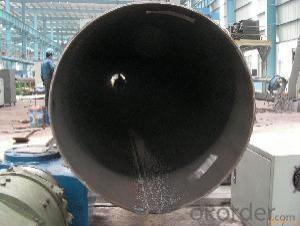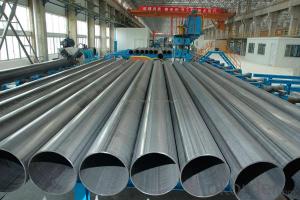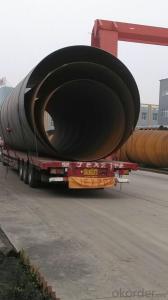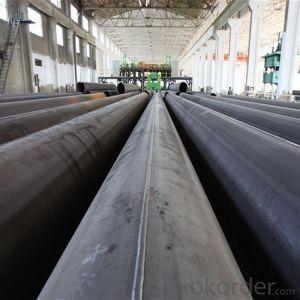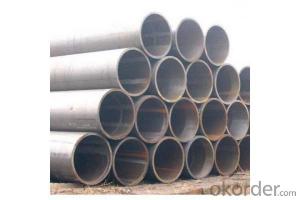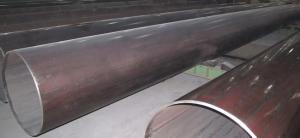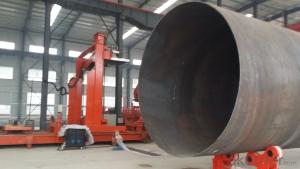38'' CARBON STEEL LSAW WELDED PIPE API/ASTM/JIS/DIN
- Loading Port:
- Tianjin
- Payment Terms:
- TT OR LC
- Min Order Qty:
- 5 m.t
- Supply Capability:
- 300 m.t/month
OKorder Service Pledge
OKorder Financial Service
You Might Also Like
Packaging & Delivery
Packaging Detail: | standard export packing or as customer's requirement |
Delivery Detail: | within 10 - 30 days |
Specifications
Spiral Welded Steel Pipes and Tubes
1.Material:Q195-Q235
2.Length:1-12m
3.WT:1.0-14mm
4.O.D.:20-273mm
Product Description:
1.Material : Q235,Q345,L245,L290,L360,L415,L450,L485,GrB,X42,46,X52,X56,X60,X65,X70,X80,X100
2,Standard: SY/T5037-2000,GB/T9711-2011,API Spec 5L PSL1/PSL2,ASTM A252\A53,ISO3183,DIN17172,EN10217,JIS G3457,AWWA C200,ASTM A139,ASTM A671,ASTM A672
3.Wall thickness: 3.0mm-30mm
4.Outer diameter: φ168mm-3020mm
5,Length: 5m-12m or as your requirement
6,Corrosion protection standard: DIN30670,DIN30671, AWWAC210, AWWA C203, SY/T0413-2002,SY/T0414-2002
7,Application: Oil, gas, natural gas, water pipe, thermal electricity pipe, steel structure engineering, etc
Q195-q345 Material Steel Pipe's Materials
Elements | Chemical Compsition% | Mechanical Property | ||||||
C% | Mn% | S% | P% | Si% | Yield Point (Mpa) | Tensile Strength(Mpa) | Elongation | |
Q195 | 0.06-0.12 | 0.25-0.50 | <0.050< span=""> | <0.045< span=""> | <0.030< span=""> | >195 | 315-430 | 32-33 |
Q215 | 0.09-0.15 | 0.25-0.55 | <0.05< span=""> | <0.045< span=""> | <0.030< span=""> | >215 | 335-450 | 26-31 |
Q235 | 0.12-0.20 | 0.30-0.70 | <0.045< span=""> | <0.045< span=""> | <0.030< span=""> | >235 | 375-500 | 24-26 |
Q345 | <0.20< span=""> | 1.0-1.6 | <0.040< span=""> | <0.040< span=""> | <0.55< span=""> | >345 | 470-630 | 21-22 |
Packaging & Delivery
Packaging Detail: | Normal exporting packing,in container or bulk vessel or as per clients' request |
Delivery Detail: | 2 months after confimed contract |
Specifications
Large Diameter API 5L X70 PSL2 LSAW Steel Pipe
Grade: X42, X46, X50, X52, X60, B, C
OD: 1.5"-28"
WT: SCH10-SCH160
Brand:TPCO
Large Diameter API 5L X70 PSL2 LSAW Steel Pipe
Specifications:
u Standard: API 5L
u Grade: B, C, X42, X46, X50, X52, X56, X60, X65, X70, X80
u OD: 1.5"-28"
u WT: SCH10-SCH160
u Length: 5-12m
u Ends Finish: plain end, bevel end, grooved end
u Surface Treatment: bare, black varnished, oiled finish, red color, anti-corrosion, 3PE, FBE or epoxy coating
u Technique: hot rolled or cold drawn
u Application: api 5l steel pipe for conveying oil, water, gas
u Invoicing: based on theoretical weight or actual weight
u Payment Terms: L/C at sight, T/T or Western Union
u Trade Terms: FOB, CFR, CIF
u Certification: ABS manufacturing assessment, ABS design assessment, API 5CT, API 5L, DNV manufacturer certificate, ISO9001 quality management system certificate, ISO14001 environment management system certificate, GB/T28001 occupational health and safety management system certificate, A1 class manufacturing license of special equipment certificate, CCS, GL, LR, SGS, TüV, PDE
- Q: How are steel pipes used in the telecommunications network infrastructure?
- Steel pipes are commonly used in the telecommunications network infrastructure as a means of protecting and housing underground cables. These pipes provide a durable and secure pathway for the cables, safeguarding them from environmental factors such as moisture, extreme temperatures, and physical damage. Additionally, steel pipes offer excellent strength and rigidity, allowing for the installation of multiple cables within a single pipe, thereby reducing costs and simplifying maintenance.
- Q: How do steel pipes compare to other materials like PVC or copper pipes?
- Steel pipes have numerous advantages over materials such as PVC or copper pipes. Firstly, their strength and durability make them ideal for high-pressure applications. They can withstand extreme temperatures and resist corrosion, making them suitable for both indoor and outdoor use. In contrast, PVC pipes are weaker and more prone to cracking and breaking under pressure or in extreme temperatures. Although copper pipes are durable, they can be susceptible to corrosion and may require additional protective coatings. Secondly, steel pipes have a longer lifespan compared to PVC or copper pipes. They are renowned for their longevity and can last for several decades without needing replacement. PVC pipes, although relatively inexpensive, have a shorter lifespan and may require more frequent replacement. Similarly, copper pipes can corrode over time and may need maintenance or replacement. Another advantage of steel pipes is their ability to handle a wide range of fluids and substances. They are commonly used in industrial applications where chemicals or corrosive materials may be present. PVC pipes, on the other hand, may not be suitable for handling certain chemicals or substances as they can react and cause damage to the pipe. Copper pipes, while generally safe for carrying water, may not be ideal for conveying certain chemicals or fluids. Additionally, steel pipes possess excellent fire resistance properties. In the event of a fire, they can withstand high temperatures and maintain their structural integrity, ensuring the safety and protection of the surrounding area. PVC pipes, however, can melt or deform under high heat, potentially causing structural damage. Although copper pipes are less prone to melting, they can still be affected by extreme heat and lose their strength. Nevertheless, steel pipes do have a few drawbacks. They tend to be heavier and more challenging to install compared to PVC or copper pipes. Additionally, they can be more expensive upfront, especially when compared to PVC pipes. However, considering their durability and longevity, steel pipes may offer better value in the long run. In conclusion, steel pipes provide numerous advantages over materials like PVC or copper pipes. They are strong, durable, resistant to corrosion, and have a longer lifespan. They can handle high-pressure applications and a wide range of fluids, making them suitable for various industrial and commercial uses. Although they may be more expensive and difficult to install, the benefits of steel pipes make them a reliable and cost-effective choice for many applications.
- Q: What are the different types of steel pipe caps?
- There exists a variety of steel pipe caps, each serving specific purposes and applications. A few commonly used types are as follows: 1. Threaded Caps: These caps possess internal threads that enable them to be screwed onto threaded pipes, ensuring a secure seal. They find frequent usage in plumbing and gas-related tasks. 2. Socket Weld Caps: These caps are designed for welding onto pipe ends using a socket weld connection. They offer a strong and permanent seal, rendering them suitable for high-pressure and high-temperature tasks. 3. Butt Weld Caps: Butt weld caps, similar to socket weld caps, are meant for welding onto pipe ends. However, they are specifically designed for butt welding, which involves directly welding the cap to the pipe without additional fittings. 4. Domed Caps: These caps have a domed or rounded shape on the upper surface, providing a smooth and visually pleasing finish. They are commonly applied in architectural and decorative tasks, such as handrails or fence posts. 5. Flat Caps: As the name suggests, flat caps possess a flat upper surface. They are often utilized when a simple and low-profile cap is required, such as for safeguarding pipe ends in industrial applications. 6. Blind Caps: Blind caps are employed to permanently seal off pipe ends. They are solid caps without any openings or threads, ensuring complete closure. They are frequently utilized in piping systems where a section of the pipeline is not in use or temporarily needs to be closed off. These examples merely scratch the surface of the various steel pipe caps available. The selection of a cap depends on specific application requirements, including the type of connection, pressure, temperature, and the necessity for structural or decorative finishes. It is crucial to choose the appropriate cap to guarantee a secure and reliable seal for the pipe.
- Q: The difference between 12Cr1MoVG alloy steel tube and 15CrMo
- With this kind of steel manufacturing products, usually by heat treatment (normalizing and tempering); parts made before use, usually need to go through refining or chemical surface treatment (carburizing and nitriding), surface quenching or high-frequency quenching treatment. Therefore, according to the chemical composition (mainly carbon content), heat treatment process and use of different, such steel can be roughly divided into carburizing, quenching and tempering and nitriding steel three.
- Q: How do steel pipes compare to other materials like PVC or copper?
- There are several advantages to using steel pipes compared to materials like PVC or copper. Firstly, steel pipes are known for their strength and durability. They can withstand high pressure and extreme temperatures without cracking or bending, making them ideal for heavy-duty applications such as industrial piping systems or underground installations. Secondly, steel pipes have excellent corrosion resistance. Unlike copper pipes that can corrode over time, steel pipes are typically coated with anti-corrosive materials like zinc or epoxy. This protective layer prevents rust and ensures a longer lifespan for the pipes. Furthermore, steel pipes offer superior fire resistance compared to PVC or copper. They are non-combustible and can withstand high temperatures for extended periods without deforming or releasing toxic gases. This makes steel pipes a safer option for applications where fire hazards are a concern. In terms of cost, while steel pipes may initially be more expensive than PVC, they offer better long-term value due to their durability and longevity. On the other hand, copper pipes can be quite expensive and are susceptible to theft due to their scrap value. Lastly, steel pipes are highly versatile and can be used in various applications such as water supply, sewage systems, gas pipelines, and oil refineries. They can handle high volumes of fluid with ease and are resistant to external factors like UV rays or physical impacts. Overall, steel pipes are a reliable and efficient choice for many industries and applications, offering strength, durability, corrosion resistance, fire resistance, and versatility that sets them apart from materials like PVC or copper.
- Q: How are steel pipes protected against fire hazards?
- Steel pipes are protected against fire hazards through various methods, including the application of fire-resistant coatings, encasement in fire-rated materials, and the installation of fire sprinkler systems. Additionally, fire stops and fire barriers are used to prevent the spread of fire and smoke through pipe penetrations in walls and floors.
- Q: How are steel pipes used in the construction of oil storage tanks?
- Steel pipes are commonly used in the construction of oil storage tanks for several purposes. Firstly, they are used to create the framework and structure of the tank, providing strength and durability to support the weight of the stored oil. Additionally, steel pipes are used for the internal and external piping systems of the tank, facilitating the transportation of oil to and from the tank. Finally, steel pipes are also employed for the ventilation and drainage systems of the tank, ensuring proper airflow and drainage to prevent any potential hazards or damage.
- Q: Can steel pipes be recycled and used for other purposes?
- Yes, steel pipes can be recycled and used for other purposes. Due to their durability and strength, steel pipes can be melted down and repurposed for various applications, including construction, manufacturing, and infrastructure projects. Recycling steel pipes not only saves resources but also contributes to reducing waste and promoting sustainability.
- Q: What do you mean by "SC" in welded pipe SC200? What's the diameter of 200?
- 200 refers to the diameter of the pipe. Personally, you should be an electrical professional, but the electrical specialty rarely uses the 200 pipe diameter unless it is used when the buried cable passes the road;
- Q: What are the common factors affecting the lifespan of steel pipes?
- Steel pipes can have their lifespan significantly reduced by various common factors. One primary factor is corrosion, which occurs when the steel is exposed to moisture, chemicals, and harsh environmental conditions, leading to rust and deterioration over time. Another determinant of the lifespan of steel pipes is the quality of materials used in their manufacturing. Higher-grade steel with better resistance to corrosion and degradation generally lasts longer compared to lower-quality materials. Proper installation and regular maintenance are crucial for ensuring the longevity of steel pipes. Inadequate support or improper alignment during installation can cause premature failure, while neglecting routine maintenance, such as cleaning and inspection, can speed up the degradation process. The operating conditions also play a role in the lifespan of steel pipes. Factors like temperature, pressure, and the type of fluid or gas being transported can affect the pipes' integrity. Extreme conditions, such as high temperatures or exposure to corrosive substances, can significantly reduce their lifespan. Excessive mechanical stress, including vibration, impact, or heavy loads, can weaken steel pipes over time. If not properly managed or accounted for during the design and installation process, this stress can lead to cracking, deformation, or even complete failure. The surrounding environment also influences the lifespan of steel pipes. Exposure to harsh weather conditions, such as extreme temperature variations or frequent freeze-thaw cycles, can expedite the deterioration process. Pollutants or aggressive substances in the surrounding soil or water can also contribute to the degradation of steel pipes. To ensure the durability and reliability of steel pipes, it is essential to consider and address factors such as corrosion, material quality, installation and maintenance practices, operating conditions, mechanical stress, and environmental factors. By doing so, the lifespan of steel pipes can be extended.
Send your message to us
38'' CARBON STEEL LSAW WELDED PIPE API/ASTM/JIS/DIN
- Loading Port:
- Tianjin
- Payment Terms:
- TT OR LC
- Min Order Qty:
- 5 m.t
- Supply Capability:
- 300 m.t/month
OKorder Service Pledge
OKorder Financial Service
Similar products
Hot products
Hot Searches
Related keywords
